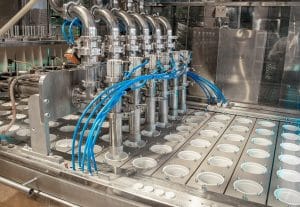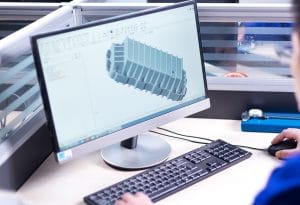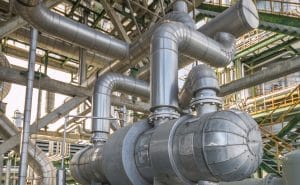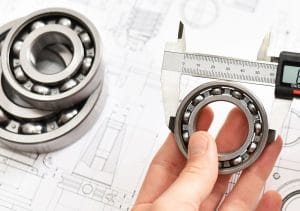 Companies in every industry that have implemented heat exchangers for most or all of their thermal management needs can point to several different areas in which better thermal management has changed their operations. However, the advantages that come with streamlining thermal management, electrical and otherwise, often extend far beyond improving productivity and efficiency for manufacturing and other corporations. For example, reducing the costs of operations means companies can offer more affordable and higher-quality products to their consumers, allowing those consumers to enjoy a higher overall quality of life. Limiting energy usage and reducing the amount of pollution generated by traditional thermal management methods also benefits the communities in which many companies operate. (more…)
Companies in every industry that have implemented heat exchangers for most or all of their thermal management needs can point to several different areas in which better thermal management has changed their operations. However, the advantages that come with streamlining thermal management, electrical and otherwise, often extend far beyond improving productivity and efficiency for manufacturing and other corporations. For example, reducing the costs of operations means companies can offer more affordable and higher-quality products to their consumers, allowing those consumers to enjoy a higher overall quality of life. Limiting energy usage and reducing the amount of pollution generated by traditional thermal management methods also benefits the communities in which many companies operate. (more…)
Thermal Solutions to Streamline Food & Beverage Production
 As manufacturing and other industrial processes have been transformed by technology, companies that rely on that technology have benefited in several important and highly impactful ways. For example, in most industries, advanced technology has changed everything from administrative tasks like bookkeeping and customer relationship management to day-to-day manufacturing and production processes. In the food and beverage industry, those changes include the ability to more efficiently and safely improve a company’s productivity, as well as their ability to consistently provide high-quality products at minimal operating costs. (more…)
As manufacturing and other industrial processes have been transformed by technology, companies that rely on that technology have benefited in several important and highly impactful ways. For example, in most industries, advanced technology has changed everything from administrative tasks like bookkeeping and customer relationship management to day-to-day manufacturing and production processes. In the food and beverage industry, those changes include the ability to more efficiently and safely improve a company’s productivity, as well as their ability to consistently provide high-quality products at minimal operating costs. (more…)
Value in Customizing Thermal Management Solutions
 Over the course of a few decades, heat exchangers changed the face of electrical thermal management for most industries. What was once a burden that companies had to strategize around became an area of innovation where companies could now streamline their operations and save significantly in the process. Today, heat exchangers continue advancing the realm of thermal management in several ways, and as technology continues to evolve, their customizability plays an increasingly more important role. For many applications, the ability to customize thermal management solutions is one of the greatest advantages of modern heat exchangers. (more…)
Over the course of a few decades, heat exchangers changed the face of electrical thermal management for most industries. What was once a burden that companies had to strategize around became an area of innovation where companies could now streamline their operations and save significantly in the process. Today, heat exchangers continue advancing the realm of thermal management in several ways, and as technology continues to evolve, their customizability plays an increasingly more important role. For many applications, the ability to customize thermal management solutions is one of the greatest advantages of modern heat exchangers. (more…)
Are Heat Exchangers Really an Improvement to Air Conditioning?
 Given the rapid advancement and the wide-scale implementation of modern heat exchangers in most industries, it seems obvious that the innovative thermal management solutions provide several advantages over traditional air conditioning. For the companies that utilize them, heat exchangers have helped them realize significant savings in overhead and energy usage, as well as much more streamlined and efficient operations. However, not every company knows or enjoys the advantages that heat exchangers provide, relying still on traditional electrical cooling solutions and carrying the burdens that they come with. (more…)
Given the rapid advancement and the wide-scale implementation of modern heat exchangers in most industries, it seems obvious that the innovative thermal management solutions provide several advantages over traditional air conditioning. For the companies that utilize them, heat exchangers have helped them realize significant savings in overhead and energy usage, as well as much more streamlined and efficient operations. However, not every company knows or enjoys the advantages that heat exchangers provide, relying still on traditional electrical cooling solutions and carrying the burdens that they come with. (more…)
What Heat Exchangers Can Do for Green Energy
 The quest to transform most or all of a company’s operations into greener and more eco-friendly processes is an important one. It’s also a goal shared by most companies in most of today’s industries, and the efforts that each organization takes depends largely on the specific industry that it’s in. In many cases, however, electrical thermal management is one of the more significant energy conservation concerns. Fortunately, most companies can overcome that concern and implement more efficient and eco-friendly solutions with the help of modern heat exchanger technology. (more…)
The quest to transform most or all of a company’s operations into greener and more eco-friendly processes is an important one. It’s also a goal shared by most companies in most of today’s industries, and the efforts that each organization takes depends largely on the specific industry that it’s in. In many cases, however, electrical thermal management is one of the more significant energy conservation concerns. Fortunately, most companies can overcome that concern and implement more efficient and eco-friendly solutions with the help of modern heat exchanger technology. (more…)
How Different Industries Use Modern Heat Exchangers
 Over the last several decades, virtually every industry has benefited from the advanced thermal management capabilities of modern heat exchangers. That’s because most industries rely heavily on technology and the ability to properly cool it, and heat exchangers helped make that ability much more prominent and less of a hassle. Today, processes ranging from cooling control panels and other electrical enclosures to helping facilitate wastewater treatment, and much more, have become less costly and more efficient for most companies. (more…)
Over the last several decades, virtually every industry has benefited from the advanced thermal management capabilities of modern heat exchangers. That’s because most industries rely heavily on technology and the ability to properly cool it, and heat exchangers helped make that ability much more prominent and less of a hassle. Today, processes ranging from cooling control panels and other electrical enclosures to helping facilitate wastewater treatment, and much more, have become less costly and more efficient for most companies. (more…)
Better Thermal Management with Minimal Maintenance
 Of all the different concerns that can come with a company’s electrical thermal management solutions, maintenance isn’t always high on the list. That’s because other concerns, such as energy costs and dedicated space, can have a much more immediate impact, especially with solutions that require a lot of both. Therefore, when heat exchangers revolutionized electrical thermal management, their ability to reduce costs and space were among their most notable benefits. However, companies also benefit greatly from another important advantage – a drastically reduced need to halt operations for routine maintenance, or for unscheduled repairs or parts replacement. (more…)
Of all the different concerns that can come with a company’s electrical thermal management solutions, maintenance isn’t always high on the list. That’s because other concerns, such as energy costs and dedicated space, can have a much more immediate impact, especially with solutions that require a lot of both. Therefore, when heat exchangers revolutionized electrical thermal management, their ability to reduce costs and space were among their most notable benefits. However, companies also benefit greatly from another important advantage – a drastically reduced need to halt operations for routine maintenance, or for unscheduled repairs or parts replacement. (more…)
Custom Heat Exchangers for Computer Processing
 Back when basic computer processing equipment took up entire rooms full of space, using comparably large air conditioners and other solutions to cool it didn’t seem out of place. However, it didn’t take long for computers, electronics, and virtually every other form of technology to advance to a point where such large solutions were no longer viable. Computers that fit on your lap or in your pocket can’t be reliably cooled using HVAC equipment, and many technology designers were hampered by this until heat exchangers became a more viable thermal solution. (more…)
Back when basic computer processing equipment took up entire rooms full of space, using comparably large air conditioners and other solutions to cool it didn’t seem out of place. However, it didn’t take long for computers, electronics, and virtually every other form of technology to advance to a point where such large solutions were no longer viable. Computers that fit on your lap or in your pocket can’t be reliably cooled using HVAC equipment, and many technology designers were hampered by this until heat exchangers became a more viable thermal solution. (more…)
Heat Exchangers Make Thermal Management Less Challenging
 The good thing about technology is that companies don’t always have to completely understand how it works to benefit from implementing it. If it was worth the investment, then the results will speak for themselves. The same is true with the electrical thermal management solutions that many of today’s technological applications utilize. For example, when heat exchangers first became popular, companies that began implementing them almost immediately began benefiting from lower energy costs, more reliable electrical cooling, and a higher level of efficiency overall. Even if they didn’t understand the specifics of the technology’s innovative heat transfer concepts, it quickly became obvious that heat exchangers made electrical thermal management much less challenging. (more…)
The good thing about technology is that companies don’t always have to completely understand how it works to benefit from implementing it. If it was worth the investment, then the results will speak for themselves. The same is true with the electrical thermal management solutions that many of today’s technological applications utilize. For example, when heat exchangers first became popular, companies that began implementing them almost immediately began benefiting from lower energy costs, more reliable electrical cooling, and a higher level of efficiency overall. Even if they didn’t understand the specifics of the technology’s innovative heat transfer concepts, it quickly became obvious that heat exchangers made electrical thermal management much less challenging. (more…)
The Importance of Precise Thermal Solutions
 Precision plays a vital role when it comes to customizing modern thermal management solutions. From highly specific operational parameters to cooling unit designs and sizes, many of today’s advanced applications require custom thermal solutions that adequately meet their unique needs. While that level of precision is important for common applications, such as cooling control panels and other electrical enclosures, it’s even more so for the advanced systems that are relying more heavily on custom thermal solutions. In industries from high-performance molding to healthcare and pharmaceutical production, and much more, the implementation of heat exchangers has helped propel the use of more advanced and precise technologies. (more…)
Precision plays a vital role when it comes to customizing modern thermal management solutions. From highly specific operational parameters to cooling unit designs and sizes, many of today’s advanced applications require custom thermal solutions that adequately meet their unique needs. While that level of precision is important for common applications, such as cooling control panels and other electrical enclosures, it’s even more so for the advanced systems that are relying more heavily on custom thermal solutions. In industries from high-performance molding to healthcare and pharmaceutical production, and much more, the implementation of heat exchangers has helped propel the use of more advanced and precise technologies. (more…)







